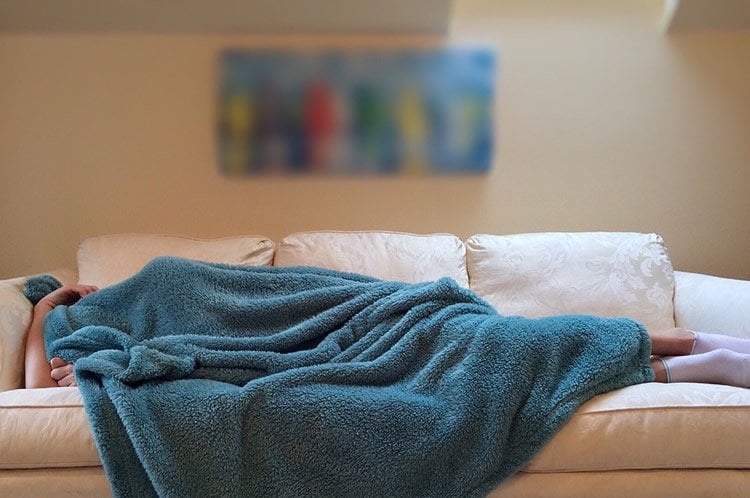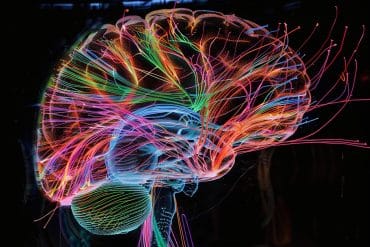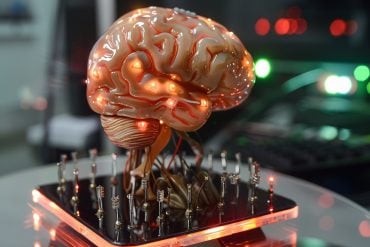Summary: According to a new study, a woman’s perception that she is experiencing a high number of hot flashes during the night can trigger mild depression during menopause.
Source: Endocrine Society.
When sleep is interrupted, women are more likely to report mood disturbances.
A woman’s perception that she is experiencing a high number of nighttime hot flashes can trigger mild symptoms of depression during menopause, according to a new study published in the Endocrine Society’s Journal of Clinical Endocrinology & Metabolism.
Menopause occurs when a woman’s ovaries stop producing estrogen and other hormones, and her menstrual periods stop, according to the Hormone Health Network. The transition takes place gradually, usually over four or five years. Among American women, the average age for menopause to occur is 51 years old. The Hormone Health Network’s interactive Menopause Map™ helps women learn more about the stages of menopause and where they are in the journey.
Using a medication to simulate the decline in a woman’s estrogen levels during menopause, the researchers found both interruption of sleep and greater frequency of perceived nighttime hot flashes were associated with mood disturbance.
“When women were awake long enough to later recall nighttime hot flashes, that perception contributed to mood disturbance in women whose estrogen levels had fallen,” said the study’s first author, Hadine Joffe, MD, MSc, of Brigham and Women’s Hospital and Dana Farber Cancer Institute at Harvard Medical School in Boston, MA. “The association was independent of sleep disruption that the women experienced.”
Twenty-nine healthy, premenopausal women between the ages of 18 and 45 took part in the study. The women took a medication to suppress estrogen production in the ovaries for a four-week period, a treatment that mimics menopause and induces menopausal symptoms to varying degrees of intensity. Before and after the four-week timeframe, researchers monitored the participants’ sleep and hormone levels. The participants completed mental health questionnaires at the beginning and end of the study.

The study found that women who reported experiencing frequent nighttime hot flashes were more likely to experience mild symptoms of depression than those who reported fewer or no nighttime hot flashes.
Although researchers also monitored the women for physiologic signs of nighttime hot flashes during the sleep study, they found only the women’s perception of hot flash frequency—not the measured number of hot flashes—was linked to changes in mood.
Women who experienced sleep interruption also were more likely to exhibit symptoms of depression than women who got more sleep. Daytime hot flashes had no effect on the participants’ mood.
“The results of our research suggest menopausal women who report experiencing nighttime hot flashes and sleep disruption should be screened for mood disturbances,” Joffe said. “Any treatment of mood symptoms in this population also should incorporate efforts to address sleep and nighttime hot flashes.”
Other authors of the study include: Sybil Crawford of the University of Massachusetts Medical School in Worcester, MA; Marlene P. Freeman, Matt T. Bianchi, Nicole Economou, and Lee Cohen of Massachusetts General Hospital and Harvard Medical School in Boston, MA; David White, Semmie Kim, and Julie Camuso of Brigham and Women’s Hospital and Harvard Medical School in Boston, MA; and Janet E. Hall of the National Institute of Environmental Health Sciences in Research Triangle Park, NC.
Funding: The research was supported by the National Institute of Mental Health.
Source: Endocrine Society
Image Source: This NeuroscienceNews.com image is in the public domain.
Original Research: Abstract for “Independent Contributions of Nocturnal Hot Flashes and Sleep Disturbance to Depression in Estrogen-Deprived Women” by Hadine Joffe, Sybil L. Crawford, Marlene P. Freeman, David P. White, Matt T. Bianchi, Semmie Kim, Nicole Economou, Julie Camuso, Janet E. Hall, and Lee S. Cohen in JCEM. Published online September 28 2016 doi:10.1210/jc.2016-2348
[cbtabs][cbtab title=”MLA”]Endocrine Society. “Nighttime Hot Flashes May Spark Mild Depression.” NeuroscienceNews. NeuroscienceNews, 30 September 2016.
<https://neurosciencenews.com/hot-flashes-depression-5169/>.[/cbtab][cbtab title=”APA”]Endocrine Society. (2016, September 30). Nighttime Hot Flashes May Spark Mild Depression. NeuroscienceNews. Retrieved September 30, 2016 from https://neurosciencenews.com/hot-flashes-depression-5169/[/cbtab][cbtab title=”Chicago”]Endocrine Society. “Nighttime Hot Flashes May Spark Mild Depression.” https://neurosciencenews.com/hot-flashes-depression-5169/ (accessed September 30, 2016).[/cbtab][/cbtabs]
Abstract
Independent Contributions of Nocturnal Hot Flashes and Sleep Disturbance to Depression in Estrogen-Deprived Women
Context:
Women are at increased risk for mood disturbance during the menopause transition. Hot flashes (HFs), sleep disruption, and fluctuating estradiol levels correlate with menopause-associated depression but co-occur, making cause and effect relationships difficult to disentangle.
Objective:
Using a GnRH agonist (GnRHa) experimental model, we investigated whether depressive symptoms are associated with HFs and/or are explained by concomitant sleep fragmentation in the absence of estradiol fluctuation.
Design and Intervention:
Depressive symptoms, objective polysomnographic sleep parameters, subjective sleep quality, serum estradiol, and HFs were assessed before and 4 weeks after open-label depot GnRHa (leuprolide 3.75-mg) administration.
Setting:
Academic medical center.
Participants:
Twenty-nine healthy nondepressed premenopausal volunteers (mean age, 27.3 years).
Results:
Serum estradiol was rapidly and uniformly suppressed. HFs developed in 69% of the subjects. On univariate analysis, worsening of mood was predicted by increases in time in light sleep (stage N1), number of transitions to wake, non-REM arousals, subjective sleep quality, and reductions in perceived sleep efficiency (all P < .045), as well as the number of nighttime (P = .006), but not daytime (P = .28), HFs reported. In adjusted models, the number of nighttime HFs reported, increases in non-REM arousals, time in stage N1, transitions to wake, and reduced sleep quality remained significant predictors of mood deterioration (P ≤ .05).
Conclusions:
Depressive symptoms emerged after estradiol withdrawal in association with objectively and subjectively measured sleep disturbance and the number of nighttime, but not daytime, HFs reported. Results suggest that sleep disruption and perceived nighttime HFs both contribute to vulnerability to menopause-associated depressive symptoms in hypoestrogenic women.
“Independent Contributions of Nocturnal Hot Flashes and Sleep Disturbance to Depression in Estrogen-Deprived Women” by Hadine Joffe, Sybil L. Crawford, Marlene P. Freeman, David P. White, Matt T. Bianchi, Semmie Kim, Nicole Economou, Julie Camuso, Janet E. Hall, and Lee S. Cohen in JCEM. Published online September 28 2016 doi:10.1210/jc.2016-2348






